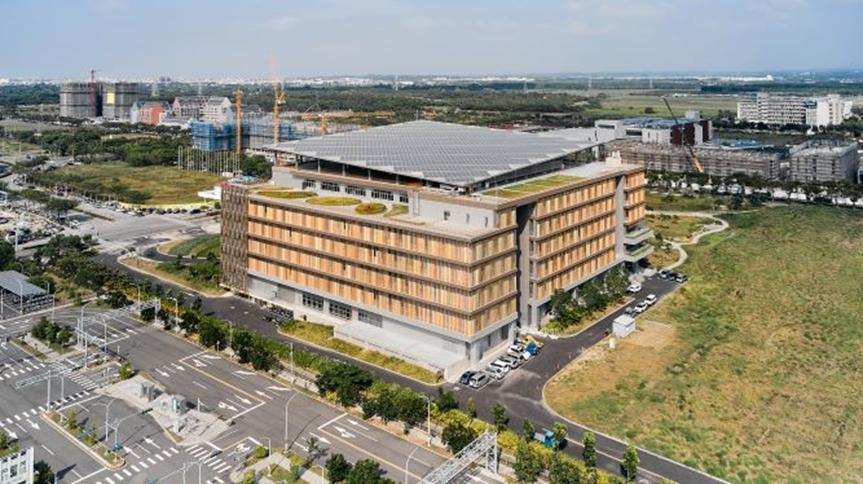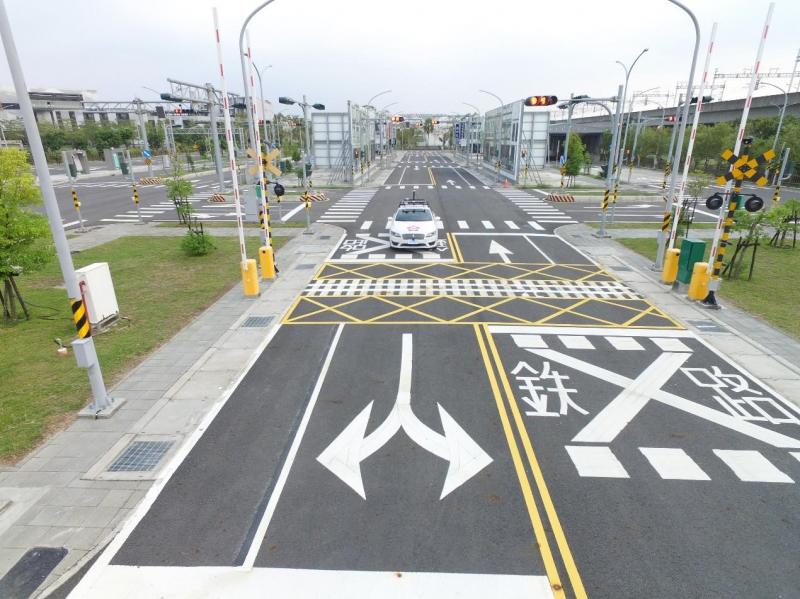With the escalation of international tensions and fierce industry competition, cybersecurity technology has become a focus of attention for countries worldwide. As the largest semiconductor manufacturing area in East Asia, Tainan is also conducting advanced research and development (R&D) into the field of cybersecurity.
In 2016, the Executive Yuan took a preemptive approach and, according to President Tsai Ing-wen's (蔡英文) 5+2 Industrial Innovation Plan, established a cybersecurity and smart technology R&D zone in Section C of the Shalun Smart Green Energy Science City.
Since the completion of the first building in April 2021, the occupancy rate has exceeded 90 percent.

Photo provided by Tainan Bureau of Economic Development
Tainan Mayor Huang Wei-che (黃偉哲) stated that the National Science and Technology Council has planned the development of a cybersecurity and smart technology research and development zone as a base for the development of cybersecurity, smart technology and new industries in Taiwan.
The development will be divided into two phases. The first phase involves cross-departmental cooperation and corporate resources to shape the industry's R&D and new entrepreneurial clusters. Currently, 19 related companies and 43 start-up teams have been recruited, including the National Institute for Cyber Security of the Ministry of Digital Affairs, the Administration for Digital Industries, Taiwan Car Lab, the Taiwan Tech Arena Southern Branch of the National Applied Research Laboratories, and uncrewed aerial vehicle and semiconductor IC design technology companies.
Currently, the R&D zone is constructing its second building and will attract international corporations to settle in by showcasing innovative technologies. Recently, Minister of Digital Affairs Audrey Tang (唐鳳) held a Southern Taiwan Cybersecurity Cluster Meeting at the Cybersecurity & Smart Technology R&D Building, which is not a branch of the Shalun Institute, but rather a vital part of it.

Photo provided by the Tainan Bureau of Economic Development
Tang emphasized that cybersecurity is not limited to northern Taiwan and invited southern leaders and related cybersecurity companies to seek assistance from the Ministry of Digital Affairs in the Shalun Institute if needed.
Huang also promised to fully support the central government's promotion of cybersecurity clusters and to establish basic public facilities, such as hospitals, to develop a talent cultivation base.
The R&D sector in the Shalun Smart Green Energy Science City has gradually matured and stabilized. According to Tainan Economic Development Bureau Director Lin Rongchuan (林榮川), the total R&D investment of the companies stationed in the city has reached NT$350 million (US$11.31 million).
With the input of high-density R&D talent and energy, it has also driven their revenue steadily upward. The total estimated revenue is expected to reach NT$1.54 billion.
The Shalun Smart Green Energy Science City is located at the core of the southern "S industry corridor," adjacent to Taiwan High-Speed Rail, Taiwan Railways Administration and the Taiwan No. 86 Expressway. It is within half an hour's reach of the Southern Taiwan Science Park and various industrial parks in Tainan.
With its convenient transportation and living functions, the business volume and revenue of the stationed companies can achieve the pioneer effect of R&D-driven investment. Through the joint efforts of the Shalun Smart Green Energy Science City and the Southern Taiwan Science Park, it will definitely become the core engine for the development of technology and economy in southern Taiwan.
Ad provided by the Bureau of Energy, Ministry of Economic Affairs and the Tainan Bureau of Economic Development

‘DENIAL DEFENSE’: The US would increase its military presence with uncrewed ships, and submarines, while boosting defense in the Indo-Pacific, a Pete Hegseth memo said The US is reorienting its military strategy to focus primarily on deterring a potential Chinese invasion of Taiwan, a memo signed by US Secretary of Defense Pete Hegseth showed. The memo also called on Taiwan to increase its defense spending. The document, known as the “Interim National Defense Strategic Guidance,” was distributed this month and detailed the national defense plans of US President Donald Trump’s administration, an article in the Washington Post said on Saturday. It outlines how the US can prepare for a potential war with China and defend itself from threats in the “near abroad,” including Greenland and the Panama

The High Prosecutors’ Office yesterday withdrew an appeal against the acquittal of a former bank manager 22 years after his death, marking Taiwan’s first instance of prosecutors rendering posthumous justice to a wrongfully convicted defendant. Chu Ching-en (諸慶恩) — formerly a manager at the Taipei branch of BNP Paribas — was in 1999 accused by Weng Mao-chung (翁茂鍾), then-president of Chia Her Industrial Co, of forging a request for a fixed deposit of US$10 million by I-Hwa Industrial Co, a subsidiary of Chia Her, which was used as collateral. Chu was ruled not guilty in the first trial, but was found guilty

A wild live dugong was found in Taiwan for the first time in 88 years, after it was accidentally caught by a fisher’s net on Tuesday in Yilan County’s Fenniaolin (粉鳥林). This is the first sighting of the species in Taiwan since 1937, having already been considered “extinct” in the country and considered as “vulnerable” by the International Union for Conservation of Nature. A fisher surnamed Chen (陳) went to Fenniaolin to collect the fish in his netting, but instead caught a 3m long, 500kg dugong. The fisher released the animal back into the wild, not realizing it was an endangered species at

DEADLOCK: As the commission is unable to forum a quorum to review license renewal applications, the channel operators are not at fault and can air past their license date The National Communications Commission (NCC) yesterday said that the Public Television Service (PTS) and 36 other television and radio broadcasters could continue airing, despite the commission’s inability to meet a quorum to review their license renewal applications. The licenses of PTS and the other channels are set to expire between this month and June. The National Communications Commission Organization Act (國家通訊傳播委員會組織法) stipulates that the commission must meet the mandated quorum of four to hold a valid meeting. The seven-member commission currently has only three commissioners. “We have informed the channel operators of the progress we have made in reviewing their license renewal applications, and